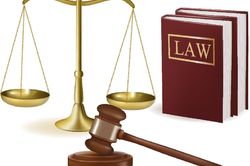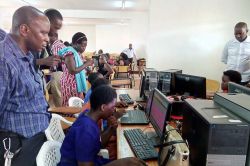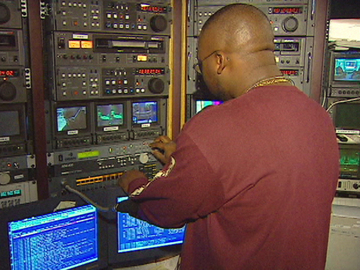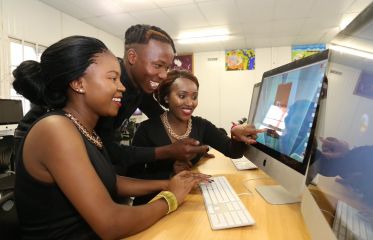Breaking News
- Ministry of Education and Sports Azerbaijan Government Scholarships For 2025-2026 Academic Year ...Read More
- Government Sponsorship Undergraduate Admission Lists 2025-26 for Makerere University ...Read More
- Ministry of Education And Sports: Egyptian Government Scholarships 2025-2026 Academic Year ...Read More
- Ground Breaker Full Scholarship for girls to study Software Engineering 2025 July Intake ...Read More
- Tony Elumelu Foundation Entrepreneurship Programme (TEEP) 2025 for young African Entrepreneurs ...Read More
- DESIGNING FUTURES 2050 International Design Competition 2025 (€15,000 prize) ...Read More
- Ground Breaker Full time Scholarship for girls to study Software Engineering 2025 Intake ...Read More
- Ministry of Education And Sports Algerian Vocational Training Scholarships for 2024-2025 AY ...Read More
- Ministry of Education and Sports Advert for the Algerian Government Scholarships for 2024-2025 ...Read More
- Uganda Dev Summit 2024 Live Stream ...Read More
Broadcast Technician
Set up, operate, and maintain the electronic equipment used to transmit radio and television programs. Control audio equipment to regulate volume level and quality of sound during radio and television broadcasts. Operate transmitter to broadcast radio or television programs.
Add to FavouritesSet up, operate, and maintain the electronic equipment used to transmit radio and television programs. Control audio equipment to regulate volume level and quality of sound during radio and television broadcasts. Operate transmitter to broadcast radio or television programs.
They are sometimes called Audio Engineer, Board Operator, Broadcast Engineer, Broadcast Maintenance Engineer, Broadcast Operations Engineer, Broadcast Technician, Engineer, Master Control Operator (MCO), Master Control Supervisor, Production Assistant,
Daily Tasks / Routine Tasks
1. Monitor strength, clarity, and reliability of incoming and outgoing signals and adjust equipment as necessary to maintain quality broadcasts.
2. Observe monitors and converse with station personnel to determine audio and video levels and to ascertain that programs are airing.
3. Monitor and log transmitter readings.
4. Report equipment problems, ensure that repairs are made, and make emergency repairs to equipment when necessary and possible.
5. Play and record broadcast programs using automation systems.
6. Control audio equipment to regulate the volume and sound quality during radio and television broadcasts.
7. Align antennae with receiving dishes to obtain the clearest signal for transmission of broadcasts from field locations.
8. Maintain programming logs as required by station management and the Federal Communications Commission.
9. Regulate the fidelity, brightness, and contrast of video transmissions, using video console control panels.
10. Select sources from which programming will be received or through which programming will be transmitted.
11. Set up, operate, and maintain broadcast station computers and networks.
12. Schedule programming or read television programming logs to determine which programs are to be recorded or aired.
13. Install broadcast equipment, troubleshoot equipment problems, and perform maintenance or minor repairs, using hand tools.
14. Preview scheduled programs to ensure that signals are functioning and programs are ready for transmission.
Main Activities
Interacting With Computers : Using computers and computer systems (including hardware and software) to program, write software, set up functions, enter data, or process information.
Getting Information : Observing, receiving, and otherwise obtaining information from all relevant sources.
Updating and Using Relevant Knowledge — Keeping up-to-date technically and applying new knowledge to your job.
Communicating with Supervisors, Peers, or Subordinates — Providing information to supervisors, co-workers, and subordinates by telephone, in written form, e-mail, or in person.
Identifying Objects, Actions, and Events — Identifying information by categorizing, estimating, recognizing differences or similarities, and detecting changes in circumstances or events.
Repairing and Maintaining Electronic Equipment — Servicing, repairing, calibrating, regulating, fine-tuning, or testing machines, devices, and equipment that operate primarily on the basis of electrical or electronic (not mechanical) principles.
Documenting/Recording Information — Entering, transcribing, recording, storing, or maintaining information in written or electronic/magnetic form.
Making Decisions and Solving Problems — Analyzing information and evaluating results to choose the best solution and solve problems.
Establishing and Maintaining Interpersonal Relationships — Developing constructive and cooperative working relationships with others, and maintaining them over time.
Tools and Technology
Some Tools used in this occupation:
Audio mixing consoles : Audio mixer consoles; Sound effect generators
Media control systems — Audio patch bays; Master control switchers; Video patch bays
Oscilloscopes — Vector scopes; Waveform monitors
Satellite receivers — Integrated receiver decoders IRD
Computer servers — Video servers
Microphones — Wired microphones
Frequency analyzers — Spectrum analyzers
Key Knowledge Areas
Computers and Electronics — Knowledge of circuit boards, processors, chips, electronic equipment, and computer hardware and software, including applications and programming.
Telecommunications — Knowledge of transmission, broadcasting, switching, control, and operation of telecommunications systems.
Communications and Media — Knowledge of media production, communication, and dissemination techniques and methods. This includes alternative ways to inform and entertain via written, oral, and visual media.
Engineering and Technology — Knowledge of the practical application of engineering science and technology. This includes applying principles, techniques, procedures, and equipment to the design and production of various goods and services.
Administration and Management — Knowledge of business and management principles involved in strategic planning, resource allocation, human resources modeling, leadership technique, production methods, and coordination of people and resources.
Mathematics — Knowledge of arithmetic, algebra, geometry, calculus, statistics, and their applications.
English Language — Knowledge of the structure and content of the English language including the meaning and spelling of words, rules of composition, and grammar.
Mechanical — Knowledge of machines and tools, including their designs, uses, repair, and maintenance.
Top Skills
Critical Thinking — Using logic and reasoning to identify the strengths and weaknesses of alternative solutions, conclusions or approaches to problems.
Active Listening — Giving full attention to what other people are saying, taking time to understand the points being made, asking questions as appropriate, and not interrupting at inappropriate times.
Monitoring — Monitoring/Assessing performance of yourself, other individuals, or organizations to make improvements or take corrective action.
Operation Monitoring — Watching gauges, dials, or other indicators to make sure a machine is working properly.
Speaking — Talking to others to convey information effectively.
Complex Problem Solving — Identifying complex problems and reviewing related information to develop and evaluate options and implement solutions.
Judgment and Decision Making — Considering the relative costs and benefits of potential actions to choose the most appropriate one.
Reading Comprehension — Understanding written sentences and paragraphs in work related documents.
Writing — Communicating effectively in writing as appropriate for the needs of the audience.
Active Learning — Understanding the implications of new information for both current and future problem-solving and decision-making.
Time Management — Managing one's own time and the time of others.
Troubleshooting — Determining causes of operating errors and deciding what to do about it.





























